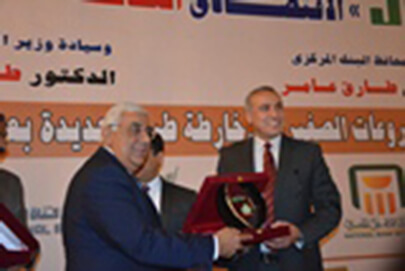SMEs Future After Exchange Rate Liberalization
27/03/2017

Today, the Governor of The Central Bank of Egypt, Tarek Amer, inaugurated the "Small Enterprises: A New Road Map after Exchange Rate Liberalization" conference organized by Al-Amwal newspaper in the presence of Gamal Negm, Deputy Governor of The Central Bank of Egypt, Sherif Sami - Chairman of the Financial Supervision Authority and the Parliamentary Bassant Fahmi. With the participation of a large number of banks leaders, economists and heads of the sector of small – medium and micro sized enterprises at the banks and the presence of a group of media men and the press.
The conference discussed a number of important economic subjects that have a direct and indirect effect on raising the development rates of the small and medium enterprises sector. The impact of the liberalization of the exchange rate on financing and the future of small and medium enterprises - financial inclusion and integration of the informal sector in the formal sector and its impact on the future of SME - a year-long harvest of President Sisi's initiative - challenges facing donor financial institutions and proposed solutions.
On the sidelines of the conference, a number of banks’ head were honored for their great efforts in stimulating the market and working according to mechanisms to promote the national economy through the development of small and medium enterprises sector in various industrial, commercial, agricultural and service activities. This is the dark horse of the national economy and raises the standard of living of citizens.
Ashraf El-Kady, Chairman of The United Bank, said that he was pleased with the award, which is a testimony to The United Bank's team that he is on the right track.
The strategy of The United Bank has been based on the national window and the specialized portal to deepen the role of small and medium enterprises in advancing the national economy and providing job opportunities and eliminating the problem of unemployment, especially with the announcement of the initiative of the President of the Republic to allocate 200 billion Egyptian pounds to develop this promising sector and the incentive and regulatory measures announced by The Central Bank of Egypt.
Therefore, the work was on several hubs. The first hub is the establishment of a specialized sector to finance the small and medium industries managed by modern scientific thought and method according to the latest standards and theories of modern management to ensure the necessary funding to support and develop this strategic sector, which represents about 70% of the Egyptian economy.
The second Hub is to qualify the team scientifically and practically to take over the task of work and maximize the benefit of this promising sector. As well as the introduction of specialized work programs to serve a wide range of customers in various activities and provide technical advice to ensure the clients the best ways to increase investment and the development and success of their projects.
The third hub is to enter deeper and study the needs of customers in various governorates of the Republic and specifically the provinces of the Delta and Upper-Egypt these areas rely heavily on agricultural and productive activities in all stages, from the cultivation of crops to the industries on which to raise animals and industries based on them. As well as business and services activities. Agriculture and its industries are characterized by the employment of a large number of citizens due to the nature of the activity itself. In view of the expansion of activity and the increase in the volume of Egyptian exports in this promising field, it has based on a range of services including transport, packaging and distribution industries.
The fourth hub: It aims at directing the productive capacity of the youth of Egypt to support the development plans and strategic projects of the State in accordance with the vision of 2030 by providing an integrated system of innovative banking solutions that support comprehensive development plans.
The bank continued to sign a number of financing agreements for specialized institutions and institutions, including the Social Fund for Development, to facilitate funding for specialized and different activities from the SME sector, including commercial activities, productive activities, service activities, etc.
Difficulties facing SMEs sector
On the difficulties facing by small and medium-sized enterprises, Ashraf El-Kady said that the development of the SMEs sector has become the hope of Egypt and a real demand for solving many of our problems and economic crises.
He pointed to the efforts exerted by The Central Bank of Egypt and the government agencies and concerned bodies to develop specific mechanisms at the administrative, economic and legal levels to help achieve the desired goal of the state, which is to raise the standard of living of citizens.
But the national awareness and the dissemination of the culture of self-employment among the youth is one of the main pillars for the development of this sector and maximize its performance in the national economy.


